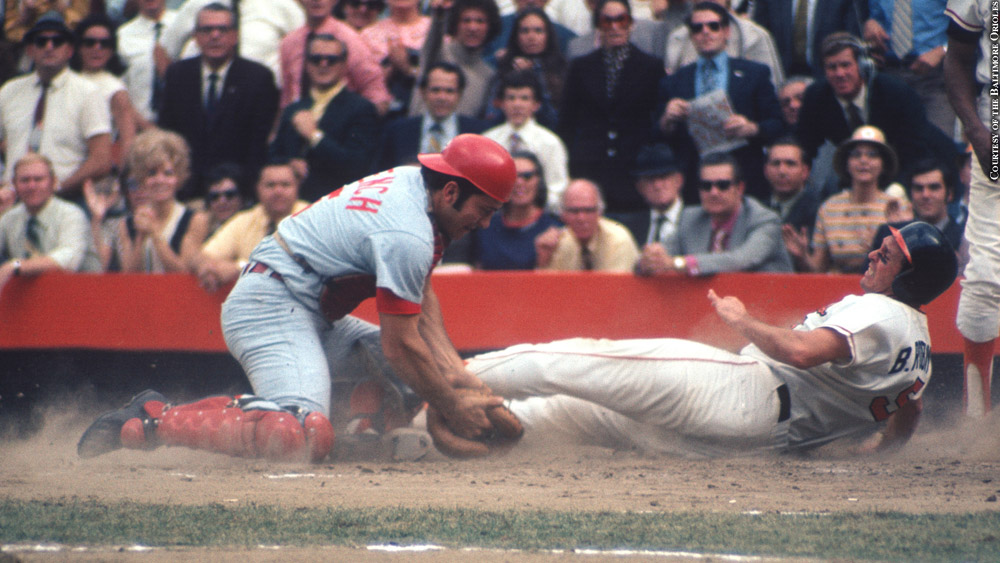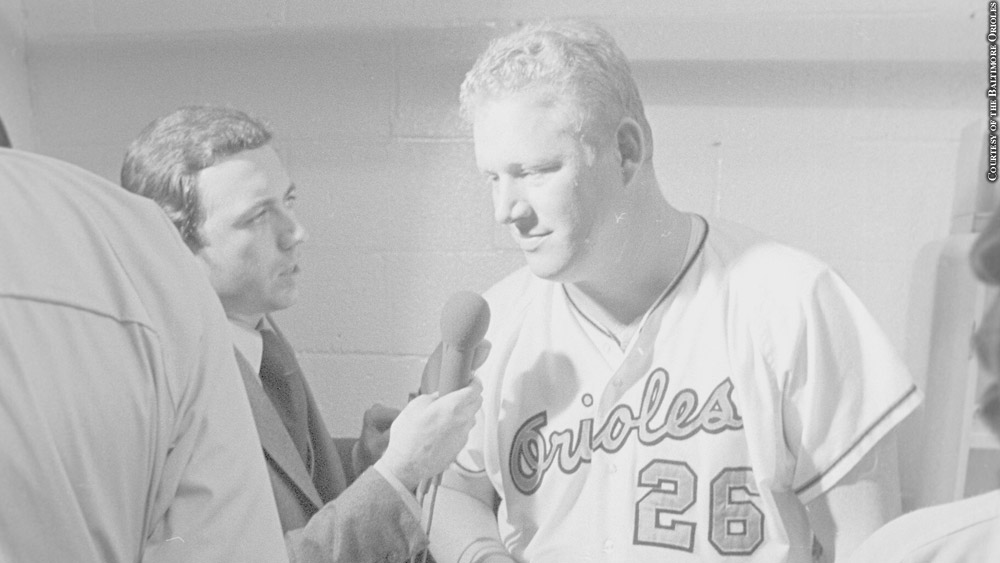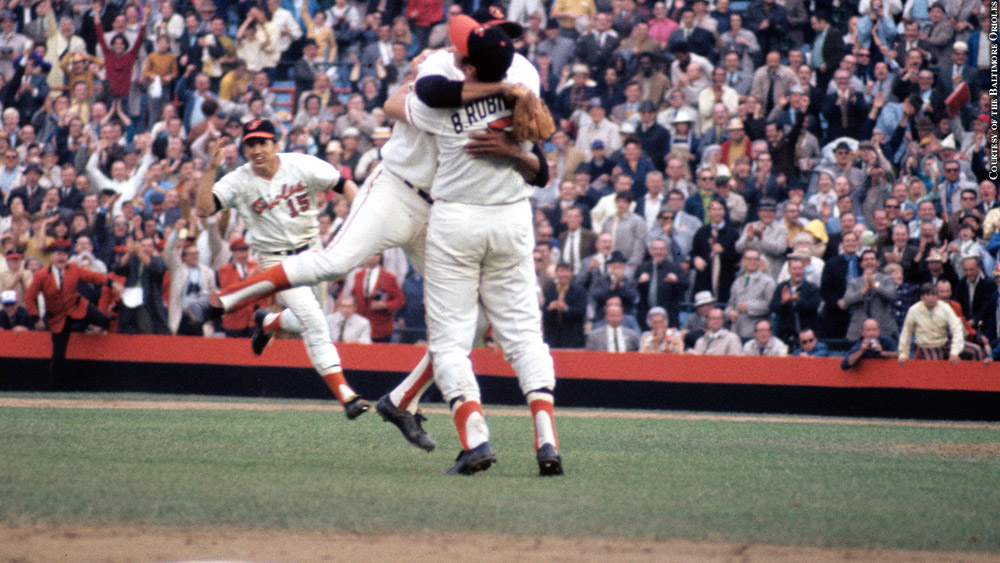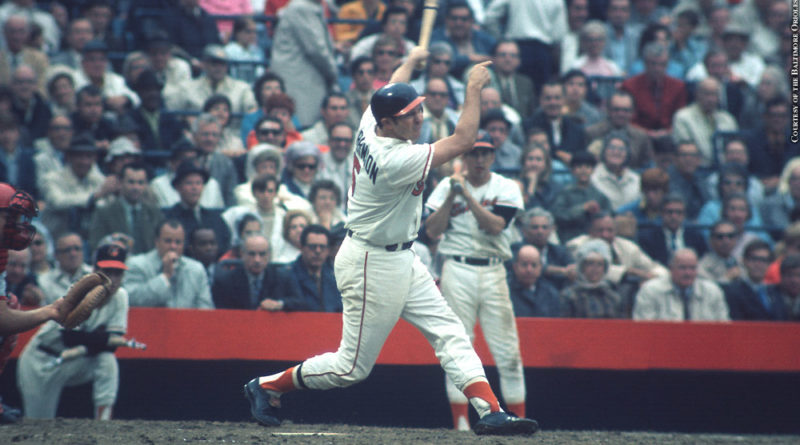This article is part of of PressBox’s celebration of the 1970 Orioles.
See Also: Jim Henneman | Stan “The Fan” Charles | Matt Kremnitzer
Golden it is. And golden it was.
This year marks the 50-year anniversary of the 1970 Orioles World Series triumph, and everything about that club and about that championship gleams.
For many Orioles fans, it is understandably the stuff of long-ago history. After all, it has been half a century.
However, considering where the Orioles have been the last few seasons, buried in the standings, and that they’ll likely struggle in the near-term as they embark on a ground-up rebuild, there’s a deliciousness to savoring past glory.
“First of all, it hardly seems like it was 50 years ago,” said Boog Powell, the slugging first baseman who can still be found at Oriole Park at his barbecue concession when the team is playing.
“Most of the memories I have are still pretty vivid. Like it happened — not yesterday — but maybe, like last week.”
The bare facts are breathtaking. Baltimore beat the Cincinnati Reds, four games to one, after sweeping the Minnesota Twins in a three-game American League Championship Series and capturing the AL East by 15 games while winning 108 regular-season contests.
And yet, although it seemed that the Orioles were destined to win it all in 1970, nothing in sports is certain. As good as the 1970 Orioles were, the previous season’s team might have been — on paper — even better. The 1969 Orioles had won 109 games. They also swept the Twins in the ALCS. But the 1969 O’s fell in five games to New York’s Miracle Mets in that World Series.
“After we lost to the Mets the year before,” Powell said, “with what I thought was as good a team as we ever had, when we came to spring training in ’70, there wasn’t a lot of talk about it — like, ‘OK guys, we got our butts kicked last year and we’re not going to let it happen again this year.’ … But it was felt and we all just had our blinders on and we were going straight ahead. There was no denying us.”

“We Had A Good Club”
In a pre-Internet, pre-ESPN culture, the 1970 World Series was also an opportunity for the greater baseball world to appreciate the wonder of Orioles third baseman Brooks Robinson. At a time when most fans gleaned their appreciation of baseball’s stars from daily newspaper box scores, it was easy for Robinson’s overall brilliance to be overlooked. Fielding that saves runs doesn’t translate to a box score.
However, in front of a national television audience, Robinson put on a dazzling defensive exhibition to go along with a 9-for-21 (.429) performance at the plate, including two home runs and six RBIs.
That earned him the World Series MVP and burnished Robinson’s Hall of Fame resume — if there were even any doubts about it.
“It meant a lot to me personally because against the Mets in the previous World Series, I went 1-for-18. So I was pretty disappointed,” Robinson said. “But we were a good team and we bounced back and won the pennant easily in ’70. I’ve always felt that if you play long enough, there are going to be times when the other side gets you and then times when you get them.”
Jim Palmer, the Orioles’ Hall of Fame pitcher, breezed through the 1970 roster to illustrate the depth of the team.
“When you look at the players,” Palmer said, “[Mike] Cuellar won 24 games that season. [Dave] McNally won 23 games. I won 20. … Boog was the American League MVP. … Frank Robinson was hardly an old 34 [he hit .306 with 25 home runs]. Don Buford arguably was the best leadoff guy in baseball. We had a Gold Glove at shortstop [Mark Belanger], a Gold Glove at third [Brooks Robinson]. Paul Blair had a great World Series [9-for-19]. We had a good club.”
“The Brooks Show”
Palmer, whose occasional contention with irascible Orioles manager Earl Weaver is well known, admitted he was surprised to learn that he would be the starter in Game 1, which was being played on the road.
The scouting report on the Reds was unequivocal; they were fastball hitters from one through seven in the lineup. Palmer was a fastball pitcher.
“Weaver says, ‘You’re starting,’ and I said, ‘What are you talking about?'” Palmer recalled. “You have one of the great screwball pitchers in Cuellar. He won the Cy Young in ’69, should have won it in ’70. And you’ve got McNally with a great curveball and can pitch in with the best of them. So why am I starting? They’re all high fastball hitters. And Earl says, ‘Not your high fastball.’ So that’s how I got to start Game 1.”
Handed that distinction, it wasn’t the best start for Palmer. The Reds jumped out to a 3-0 lead with the Reds’ Lee May slamming a two-run homer in bottom of the third inning. May, who would later play in Baltimore, was the Orioles’ chief nemesis in the 1970 Series.
Powell sparked the Orioles’ offense with a two-run homer in the fourth off Reds starter Gary Nolan.

Palmer settled down and quieted the Reds with Orioles catcher Elrod Hendricks hitting a solo homer in the fifth to tie the game, 3-3. Brooks Robinson also hit a solo home run in the seventh for what would be the final 4-3 score.
Game 1 was marked by two remarkable plays. One was the defensive play that was the beginning of what Palmer called “The Brooks Show.”
In the Reds’ sixth inning, May — already 2-for-2 — hit a smash down the third base line that was headed for extra bases, except for Brooks Robinson’s gold glove. Robinson darted across the foul line, speared the ball backhanded and uncorked an overhand, off-balance, cross-diamond, one-hop strike to Powell for the out.
There would be several more Robinson defensive plays in the Series that may not have been as dazzling but still turned lightning bolts off the Reds’ bats into outs, drawing wide-eyed praise from Cincinnati manager Sparky Anderson and catcher Johnny Bench.
Not so pretty was a Game 1 play at the plate that stands as one of the most controversial in Series lore.
The score was tied 3-3 in the bottom of the sixth. Cincinnati’s Bernie Carbo was on third base, and Ty Cline was the pinch hitter. Cline bounced a high chop in front of the plate that Hendricks fielded on the first base side. As Palmer yelled to his catcher that Carbo was headed home, the Reds runner tried to navigate around home plate umpire Ken Burkhart.
Hendricks dove at Carbo and tagged him with his glove — but the ball happened to be in the catcher’s bare hand. For his part, Carbo missed the plate altogether with his slide. Burkhart, who was knocked to the ground by Hendricks, called Carbo out. While Anderson and Carbo argued, Carbo inadvertently did step on the plate, but he was out.
For Game 2, Cuellar started for the Orioles and again the Reds took the lead, this time 4-0 after four innings. And again, it was Powell who broke the scoring seal for the O’s with a towering shot to center that made it 4-1.
“The second one off [Jim] McGothlin was just a fastball low and away, and I hit the stuff out of that ball and it went into the upper deck. And if you asked Johnny Bench how many home runs were hit into that upper deck in center field, he could probably count them on one hand,” Powell said.
As the game wore on, the Reds’ weakness revealed itself. Cincinnati’s pitching was not nearly as deep as Baltimore’s staff.
The O’s exploded for five runs in the fifth as Anderson trotted out three pitchers. Blair, Powell and Brooks Robinson all had RBI singles and Hendricks hit a two-run double for a 6-4 lead. The O’s held on for a 6-5 win and a 2-0 Series lead going back to Baltimore’s Memorial Stadium.
“They were hurt a little in the pitching department,” Robinson said, “and we took advantage of that.”
For instance, Jim Merritt, the Reds’ only 20-game winner, was nursing a sore arm and wouldn’t appear in the Series until Game 5.
With the Reds squandering big leads in two games at home and the Series now in Baltimore, the outcome seemed inevitable.
“It’s What You Play For”
Baltimore cruised, 9-3, in Game 3 as McNally pitched a complete game and hit a grand slam.
Palmer started Game 4 and took a two-run lead into the eighth. But after two Reds reached base, Eddie Watt relieved Palmer and surrendered a three-run home run to May.
In Game 5, the Reds followed a familiar pattern getting three quick runs off Cuellar, but that would be all the offense for Cincinnati as the screwball artist went on to pitch a complete game. Meanwhile, the Orioles roughed up Merritt, chasing him in the second inning with Anderson remarking to Bench as Merritt left the mound, “He didn’t have nothing, did he John.”
Baltimore went on to capture the World Series with a 9-3 win.

“One of the most impressive things I remember and won’t forget is Sparky Anderson walking into our clubhouse and coming up to every one of us and saying, ‘Great game guys, you beat our butts fair and square,'” Powell said. “I was more impressed with that than anything else.”
Pete Rose apparently wasn’t feeling quite as generous.
“Rose was on the top step of the dugout there hollering about how lucky we were and couldn’t beat them again,” Powell said. “I don’t want to make a big deal about it because I never responded, and I might have been the only one to hear that.”
If it weren’t for Brooks Robinson’s glittering performance in the field and in the batter’s box, Powell might have been the Series MVP. He had two homers, five RBIs, six runs scored and was on base 10 times.
“It was always my observation that if the game was on the line, I would want Brooksie at bat,” Powell said. “That’s how I always felt about it and I played with him for 10 years.”
For his part, Robinson was happy to win MVP, especially after the disappointment of the ’69 Series, but in typical fashion, he couched the success in 1970 in terms of a team achievement.
“It’s what you play for from the time you’re in the minors and working your way to the big leagues,” the Hall of Fame third baseman said. “It’s to win a pennant and then win the World Series.”
Photo Credits: Courtesy of the Baltimore Orioles

